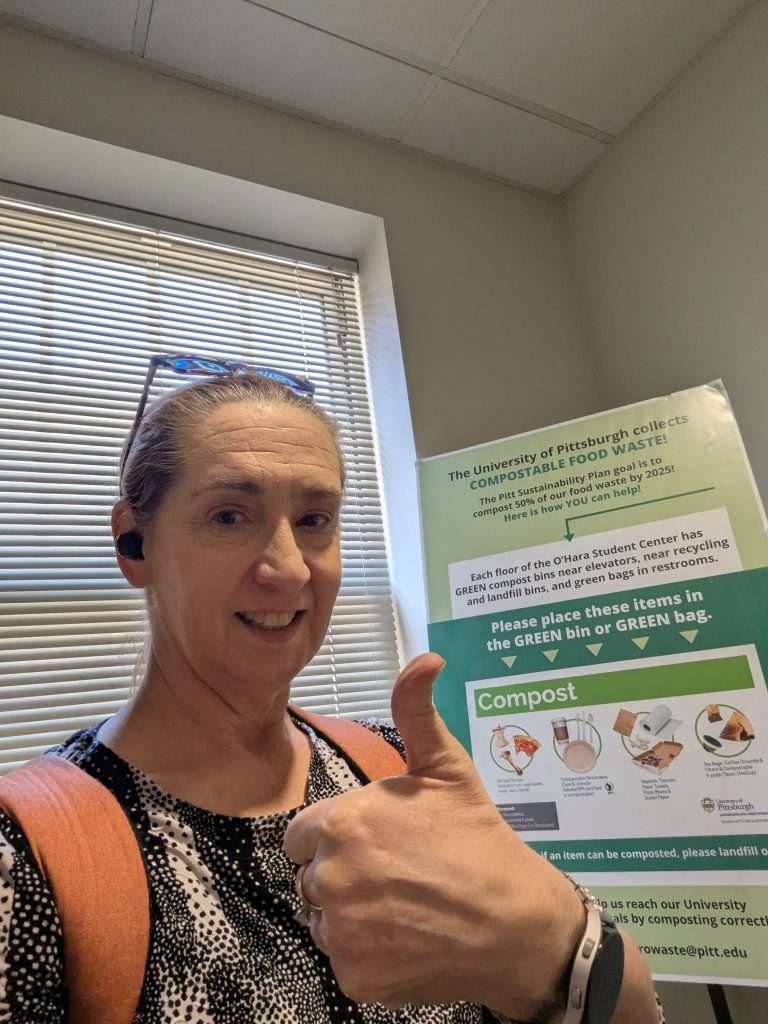The Pitt Green Spotlight is a monthly series highlighting people advancing sustainability, including Pitt Green Ambassadors and Pitt’s Green Offices & Labs!
We hope these spotlights will inspire you to try out new sustainable practices in your own campus experience! Want to be included in our next highlight? Contact us.
Pitt Green Spotlight:
Suzanne Doolen, Lab Manager, Gold Lab

Suzanne dropping off BST compost at the O’Hara Student Center.
Suzanne Doolen (she/her/hers) is the lab manager for Dr. Michael Gold’s lab in the Department of Neurobiology, where she integrates sustainability into the daily operations of scientific research. With a BS in pharmacology from UC Santa Barbara and a PhD in pharmacology and toxicology from UC Irvine, Suzanne has a strong background in scientific research and is committed to advancing environmentally responsible practices in the lab. She became a member of the sustainability club in April 2025, where she focuses on promoting thoughtful purchasing decisions, reducing waste, and supporting green lab initiatives. Suzanne’s passion for sustainability grew from early environmental efforts, like recycling aluminum cans as a child, and has expanded through her work in academia, where she sees great potential for change in research practices. Outside of her professional work, she enjoys taking bike trips along the Great Allegheny Passage (GAP).
What got you interested in sustainability and acting on climate change?
I’ve always cared about the environment—from recycling cans as a kid to living in the Environmental Awareness Hall during college—but that concern has deepened as I’ve watched meaningful climate action stall at the federal level. In the face of an increasingly anti-progressive political climate, campus and lab sustainability programs offer a way to take direct, measurable action. I can drive down the environmental impact of research by making intentional, systems-level changes in how our lab operates. It’s a practical way to contribute to climate solutions when large-scale leadership is lacking.
How would you recommend those just getting started with sustainability on campus get involved?
Start by paying attention to what’s already available around you. Notice where composting and recycling stations are located and make a habit of using them. We specifically need to encourage our composting program. Most people don’t realize that, because we use industrial-level composting, we can compost tissues, paper towels, even greasy pizza boxes. https://www.sustainable.pitt.edu/campus-culture/zerowaste/compost/
Also, ask questions in your department about green lab certification or purchasing practices. Sustainability includes making small, consistent choices in your daily routine and using the systems already in place to reduce your footprint.
What sustainability challenge would you like to tackle next, and what would you like to see the university address?
One of the most immediate and impactful areas for improvement is in research labs. Biomedical research is inherently consumable-intensive, but that also means there is significant room to reduce waste. A clear opportunity is improving how we handle packaging—especially recycling the massive amounts of cardboard and Styrofoam that come with lab shipments. It’s certainly low-hanging fruit that could make a big difference campus-wide. That’s why we encouraged every lab on our floor to become a green lab.
Thanks to Suzanne and the whole lab team for all your efforts to advance sustainability at Pitt!














